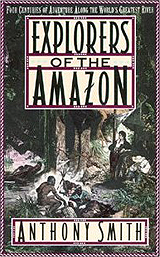
Dwindling Amazon alive in dark history
|
This review first appeared in the San Diego Evening Tribune in 1990.
Then the Amazon River Basin makes headlines today, it is usually in reference to the intense government-sponsored deforestation currently denuding the world's largest tropical rain forest.
The lower Amazon was discovered and settled long before the founding of Jamestown. But only half a century ago, fully 50 years after the U.S. frontier had vanished, vast reaches of the world's largest river had never been explored by Europeans or their descendents.
Anthony Smith's "Explorers of the Amazon" is a well-written, enjoyable introduction to the history of this most incredible of rivers. It is not comprehensive in scope, but instead focuses on the more riveting characters and events of its 450-year relationship with European explorers, conquerors, scientists and the seemingly unavoidable (wherever westerners are concerned) businessmen.
It's a violent history, but Smith neither glosses nor unduly tarries over the brutality. Two of the chapters are about particularly violent episodes, but the author shows equal verve in detailing scientific accomplishment elsewhere.
The chapter on Charles Marie de la Condamine is one of the more interesting. La Condamine was sent from Paris to Peru in 1735 to make astronomical measurements from the equator to help settle a scientific feud: Did the Earth bulge along the equator, as Newton had theorized, or at the poles, as Cassini had argued? A similar expedition went to Lapland, made its measurements, and returned home within two years. By the time all the surviving members of La Condamine's group made it back to France, the question of the Earth's true shape had been settled for over three decades.
The two bloody chapters – also interesting, after a fashion – concern a man who would be king (Lope de Aguirre) and a man who saw nothing wrong in enslaving and brutalizing Indians, as long as it made him rich (Julio Arana).
Aguirre was a former soldier of fortune who, while on a gold-seeking expedition in the Andes in 1559, conspired to have the leader killed. Before Aguirre himself was killed two years later in Venezuela (on his way to conquer Peru), he had murdered or ordered murdered nearly everyone else under his new command.
Arana was a very wealthy producer of rubber whose troubles began in 1907 when two young Americans, Walter Hardenburg and W.B. Perkins, encountered some of the Indians enslaved on Arana's rubber farms. Both were subsequently taken into custody by Arana's officers. After being freed, Perkins fled back to the U.S., but Hardenburg had a mission: He spent the next six years trying to publicize the miserable conditions being imposed on the Indians.
The stories, rebuilt through research of original diaries, logs and early histories, are lent a romanticized air by Smith's British prose and correspondingly dry humor. It is perhaps this very-British ability to look beyond the horror of perfectly horrifying situations which makes "Exploring the Amazon" so enjoyable.
Thus, after a reader has spent the entire book immersed in Smith's style of finding excitement in tragedy, the author's closing remarks on the future of the river are particularly sobering:
"Optimistic scientists around the Amazon expect no more than 10 per cent of the trees to be left standing, but think 5 per cent much more probable. When that situation has been reached, in two or three decades from now, the Amazon will have been altered beyond recognition ... There will still be the water (although lack of trees will lead to lower levels), and it will still be the greatest river in the world – in size, in flow, in the area it drains – but it will no longer be a place for exploration, not even in its smallest tributaries. The age of its discovery, which lasted for centuries, will finally have drawn to a close."

